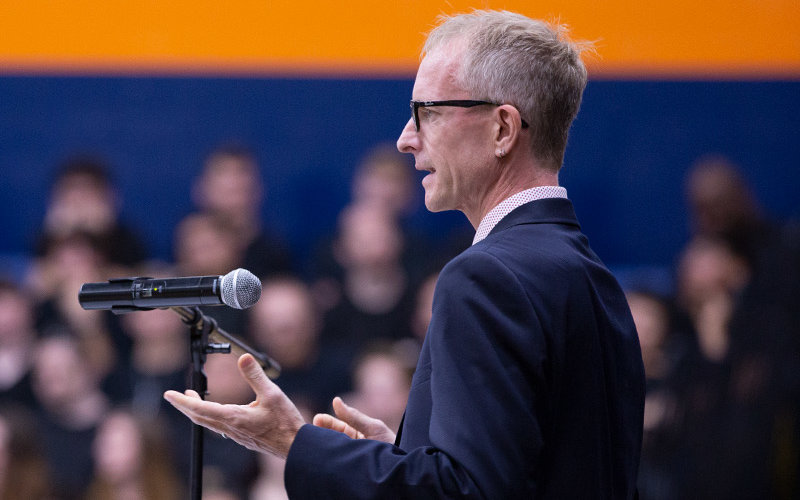
Why don’t men ask for directions? Why is it so hard for them to seek help?
For more than 20 years, Matt Englar-Carlson, professor of counseling, has been exploring the psychology of masculinities, not just for answers to why men behave the way they do, but more importantly, to figure out how mental health professionals can help them live healthier lives.
“My focus really has been on mental health outcomes,” says the 2019 Outstanding Professor Award recipient. “It’s really been looking at 40-50 years of research and boiling it down to something that health professionals can use to help men.”
Englar-Carlson will be discussing what it means to be male, well-adjusted and healthy in his 2 p.m. Oct. 8 Outstanding Professor Lecture, “What Does It Mean to Be a Healthy Man? Exploring Ideas of Positive Masculinities.” The event will be held in Portola Pavilion of the Titan Student Union. A reception will follow.
Because some men have difficulties sharing more personal or sensitive aspects of their lives and may not see it as necessary, “most of my work is on teaching health professionals to be more male friendly to increase help-seeking and successful engagement with boys and men,” explains the lead author of the American Psychological Association’s (APA) Guidelines for Psychological Practice for Working With Boys and Men.
As an example, some men are socialized to not talk about certain aspects of their lives, to be stoic and independent, to take care of things on their own — which can be helpful in some situations and settings, but not if that is all that one has, says Englar Carlson. “There are other times where men need to be responsive to the situation and respond in more adaptive ways.”
But as men get older and need help, they are often afraid to ask for it. Or if they experience emotions and feelings that they’ve never felt before, it can affect them both mentally and physically. One of the biggest questions is why the mortality rate for men in the United States is roughly five years less for men than women.
“It’s not surprising,” he explains. “It is not due to biology, but rather health behaviors over time. For many men there is a lack of preventative care, engagement in risky behavior, and a range of health behaviors detrimental to their well-being. Importantly, men also then have poorer relationships over time, to the extent of often not having a significant relationship beyond their spouse … and if their spouse has died, men struggle to mobilize social support or networks.”
Rather than focusing on the difficulties that men experience, Englar-Carlson says he thinks more about what can or could go right with men. With a positive or healthy masculinity, men and adolescent boys have a way to address the challenges facing them today. “We give them an idea of how things can be different … a path forward throughout their lives.”